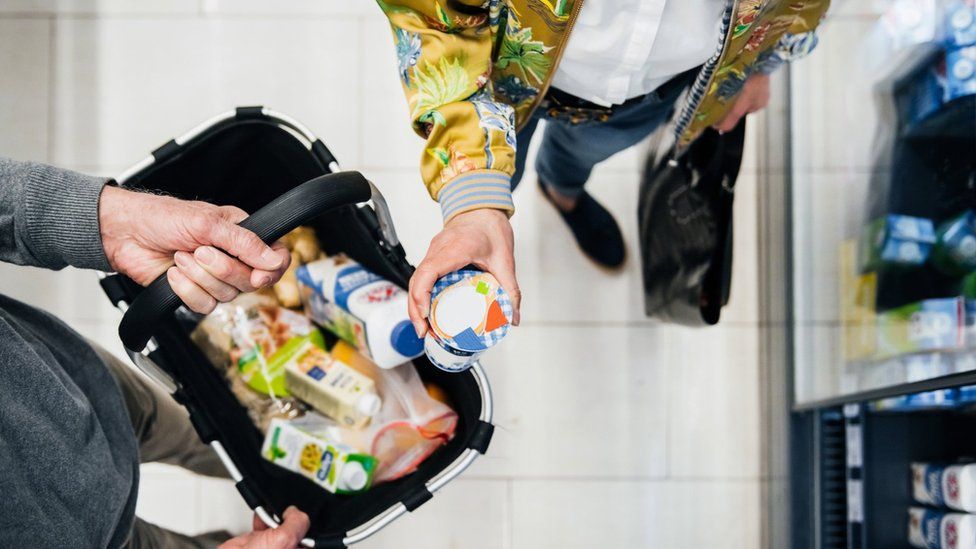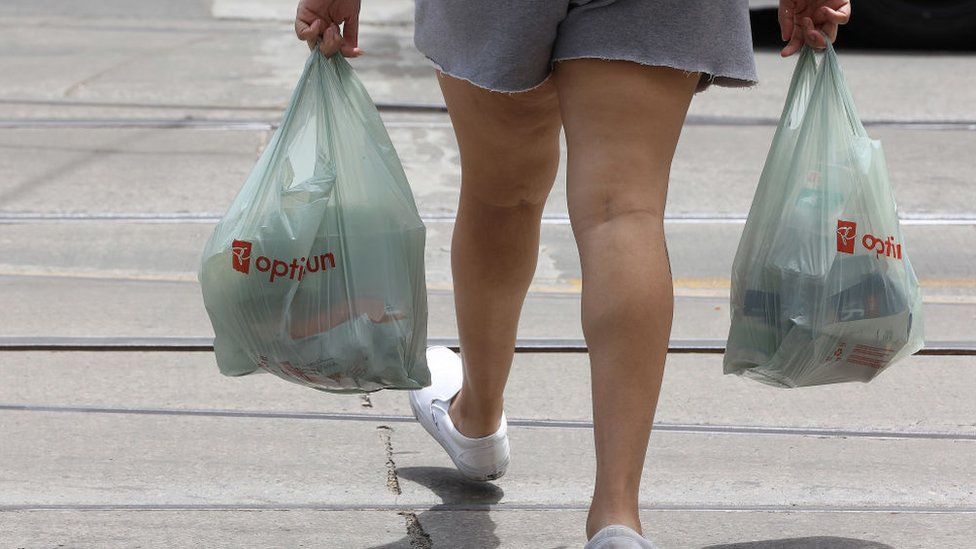Inflation: Why Canada grocers are accused of 'greedflation'
- Published
- 2 hours ago
 Image source, Getty Images
Image source, Getty ImagesLike many around the world, Canadians are struggling with the cost of food. But amid accusations of "greedflation" - taking advantage of inflation to raise prices - the country's largest grocery chains say they aren't to blame.
With food prices mounting, Canadian grocery store giant Loblaw made a promise: the cost of products under its lower-cost in-house brand, No Name, will remain frozen for three months.
The offer, announced in a promotional email by Loblaw CEO Galen Weston on 17 October, wasn't well-received. Some labelled it a PR stunt, while others declared it too little, too late.
The sour reaction isn't without reason. Inflation has slowed in recent months, but the cost of food is still soaring with increases reaching a 41-year high.
At the same time, large corporations - including grocers - are reporting record earnings. Loblaw's first-quarter profit this year was up nearly 40% from that of last year, and its net earnings after adjustments were up 17%.
In Canada, where distrust in grocery magnates runs deep from a recent bread price-fixing scandal, this dilemma has turned political.
Members of parliament have accused grocery chains of taking advantage of inflation to raise prices more than needed - a phenomenon dubbed by some "greedflation".
On the same day Mr Weston's letter was sent, Canada's parliament unanimously passed a motion that accused grocery CEOs of "corporate greed". On Monday, the federal competition watchdog launched an investigation into the sector.
But is there any truth to the idea of greedflation? Economists say it's complicated.
'No safe space … not even the freezer aisle'
For families who frequent grocery stores, the drastic increase in prices is hard to ignore. Canada's food prices in September were up 11.4% compared to 6.9% overall inflation.
"There's no safe space for consumers at the grocery store, not even the freezer aisle," said Sylvain Charlebois, a professor at Dalhousie University in Nova Scotia who has been publishing an annual report on Canadian food prices since 2010.
The problem isn't unique to Canada. The UK has seen a drastic rise in food prices as well - bread and cereals were up by an annual 12.4% in July, and oils and fats were up 23.4%.
So has the US, where the cost of food was up 13.5% in September compared to last year.
In all three countries, the factors driving up the cost of food are similar: a surge in demand for groceries since the start of the pandemic, coupled with Covid-19 outbreaks, has disrupted supply. Add to that the war in Ukraine, which has affected supplies of fertiliser, wheat and other crops, sending global prices soaring.
Bad weather this year has also disrupted the growth of certain crops, and fuel has gotten more expensive.
Grocers say they want to help
As shoppers grow more frustrated, grocery companies around the world have moved to freeze prices in a show of solidarity.
In May, US company Weis Markets announced a multi-million dollar campaign to cut prices on its best-selling frozen products. France's Carrefour froze the price on 100 everyday products in August, and the UK's Asda and Morrisons both cut prices in April.
But when Canada's Loblaw froze prices months later in October, it felt too late.
"Frankly, they have done nothing for a long time," said David MacDonald, an economist with the left-leaning Canadian Center for Policy Alternatives.
He added the prices of goods that the grocer froze had already gone up from earlier this year. No Name chicken wings, for example, were C$11.99 ($8.75; £7.75). Now they are $13.99.
Loblaw CEO Mr Weston has said the price increases at his stores are "maddeningly" out of his company's control. Some, like Canadian member of parliament Alistair MacGregor, disagree.
The announcement, the left-leaning New Democrat said, "demonstrates the fact that the CEO of Loblaw always had it within his power to freeze prices".
He also criticised the company for making the announcement the same day parliament was set to vote on probing the profits of grocery retailers, calling it a "PR attempt to deflect from the negative attention".
With grocers reporting an increase in profits, Mr MacGregor said there's likely "a moral call there for companies to reform their business practices" to curb inflation and help struggling families.
In dollars, grocers have made an average of $1.5bn in the first two quarters of 2022, up from $800m in 2019. Their margins are also higher than pre-pandemic - 3.5% in 2022, up from 2% in 2018, despite the increase in production costs.
Grocers have attributed the higher margins to an increase in sales and efficiency.
Meanwhile, an August poll suggested that more than half of Canadians can't keep up with the current cost of living, and 78% believe grocers are to blame for soaring food prices.
Are grocery stores to blame?
It was only a few years ago, Mr Charlebois recalled, that Loblaws was exposed for its role in a bread price-fixing scandal that saw major retailers conspiring with commercial bakeries to set higher prices over 14 years.
For its role in the scandal, Loblaws offered shoppers $25 gift cards as an olive branch.
"It really bothered a lot of Canadians at the time," Mr Charlebois said.
But after researching recent earnings reports of both American and Canadian grocery giants, Mr Charlebois said he isn't certain the blame for rising costs should entirely lie on retailers.
 Image source, Toronto Star via Getty Images
Image source, Toronto Star via Getty ImagesHe found that while revenues did go up, gross margins for companies have increased by what he said are modest amounts.
"Yes, they've actually posted record profits in dollars," Mr Charlebois said. "But when you look at margins, they're relatively similar."
He cautioned that this doesn't rule out wrongdoing in other parts of the supply chain - from food processing to transportation.
In Quebec, meat packers in particular are under fire for allegedly conspiring to raise prices on beef sold in the province. One of the companies in question, JBS, already settled a similar lawsuit earlier this year in the US.
Some suppliers, however, have accused grocery retailers of not accepting price increases and imposing additional fines on them - a problem they say should be fixed by implementing an industry-wide code of conduct in Canada.
That is why many welcome the decision by parliament's agriculture committee and the competition bureau to look at the grocery retail market - probes that politicians like Mr MacGregor hope will pave the way for better industry practices in the future.
"It's a good thing for Canadians", who at the very least will get some clarity on how their food is priced, said Mr Charlebois.
